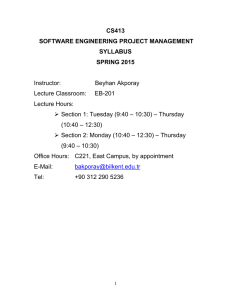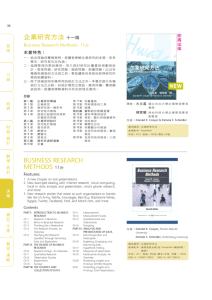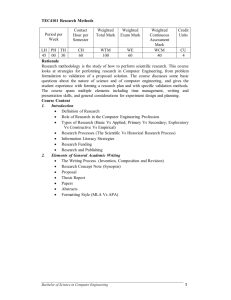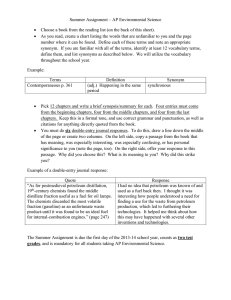ASSESMENTS, GRADING SCALE, and FZ RULE
advertisement
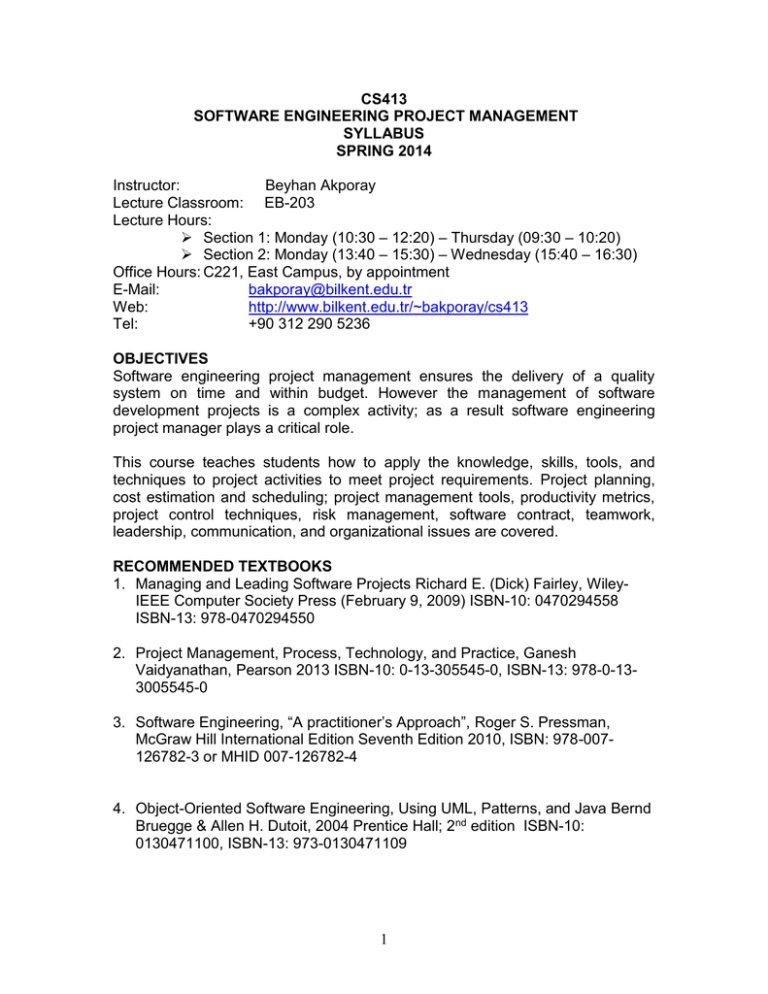
CS413 SOFTWARE ENGINEERING PROJECT MANAGEMENT SYLLABUS SPRING 2014 Instructor: Beyhan Akporay Lecture Classroom: EB-203 Lecture Hours: Section 1: Monday (10:30 – 12:20) – Thursday (09:30 – 10:20) Section 2: Monday (13:40 – 15:30) – Wednesday (15:40 – 16:30) Office Hours: C221, East Campus, by appointment E-Mail: bakporay@bilkent.edu.tr Web: http://www.bilkent.edu.tr/~bakporay/cs413 Tel: +90 312 290 5236 OBJECTIVES Software engineering project management ensures the delivery of a quality system on time and within budget. However the management of software development projects is a complex activity; as a result software engineering project manager plays a critical role. This course teaches students how to apply the knowledge, skills, tools, and techniques to project activities to meet project requirements. Project planning, cost estimation and scheduling; project management tools, productivity metrics, project control techniques, risk management, software contract, teamwork, leadership, communication, and organizational issues are covered. RECOMMENDED TEXTBOOKS 1. Managing and Leading Software Projects Richard E. (Dick) Fairley, WileyIEEE Computer Society Press (February 9, 2009) ISBN-10: 0470294558 ISBN-13: 978-0470294550 2. Project Management, Process, Technology, and Practice, Ganesh Vaidyanathan, Pearson 2013 ISBN-10: 0-13-305545-0, ISBN-13: 978-0-133005545-0 3. Software Engineering, “A practitioner’s Approach”, Roger S. Pressman, McGraw Hill International Edition Seventh Edition 2010, ISBN: 978-007126782-3 or MHID 007-126782-4 4. Object-Oriented Software Engineering, Using UML, Patterns, and Java Bernd Bruegge & Allen H. Dutoit, 2004 Prentice Hall; 2nd edition ISBN-10: 0130471100, ISBN-13: 973-0130471109 1 ASSESMENTS, GRADING SCALE, and FZ RULE Assessment Team Grading %50 Project Charter Software Requirements Specification (SRS) Software Project Management Plan (SPMP) – PART A Software Project Management Plan (SPMP) – PART B Project Presentation Individual Grading %50 Midterm Final Performance – attendance, in-class participation, questions answered during project presentation Weight Date %5 %10 3rd Week 6th Week %10 10th Week %15 13th Week %10 15th Week %15 %25 %10 8th Week 15th Week Grading Scale A+: A: A-: B+: B: B-: C+: C: C-: D+: D: F: FX: FZ: 91-100 87-91 83-87 79-83 75-79 70-75 65-70 60-65 55-60 50-55 0-50 FZ grade is assigned when either one of the following happens by 15th week: Lecture attendance is less than 18 hours Individual assessment is less than 10 points Total achievement from both individual assessment and team assessment is less than 30 points 2 COURSE OUTLINE Introduction Chapter 1 Why managing and leading software projects are difficult, the nature of project constraints, a workflow model for software projects, the work products of software projects, the organizational context of software projects, organizing a software development team, maintaining the project vision and product goals, and the nature of process frameworks, software engineering standards, and process guidelines. Process Models for Software Development Chapter 2 Elements of the development process framework, distinctions among users, customers, and acquirers, several commonly used process models for software development, and how they influence management of software projects. Establishing Project Foundations Chapter 3 The nature of requirements engineering, determining the scope of a project, and establishing a contractual agreement Plans and Planning Chapter 4 The planning process for software projects and description of IEEE template (Standard 1058) Software Project Management Plan (SPMP) Project Planning Techniques Chapter 5 Rolling-wave planning, developing an architecture decomposition view, Work Breakdown Structure (WBS), project schedule, resource profiles, and resource Gantt charts Estimation Techniques Chapter 6 Software product size measures, pragmatic, theory-based, and regression based estimation techniques, capabilities of estimation tools 3 Measuring and Controlling Work Products Chapter 7 Product measures for different kinds of work products, the role Configuration Management in measurement and control of work products, the roles of inspections, walkthroughs, and developer testing, ways to document and analyze defects and defect repairs Managing and Controlling Work Processes Chapter 8 Measure and analyze original effort, schedule, and work products, Earned Value techniques to forecast estimated actual cost and completion date for software projects Managing Project Risk Chapter 9 Methods and techniques used to identify, analyze, prioritize, and mitigate risk factors, risk mitigation strategies of avoidance, transfer, acceptance, immediate action, and contingency plans Teamwork, Leadership, and Communication Chapter 10 Managing versus leading, the nature of teams and teamwork, techniques for maintaining morale and motivation, and personality styles Organizational Issues Chapter 11 Elements of corporate cultures, mission and vision statements, intellectual capital, key personnel roles, responsibility versus authority, reward structure, and ethical behavior 4
